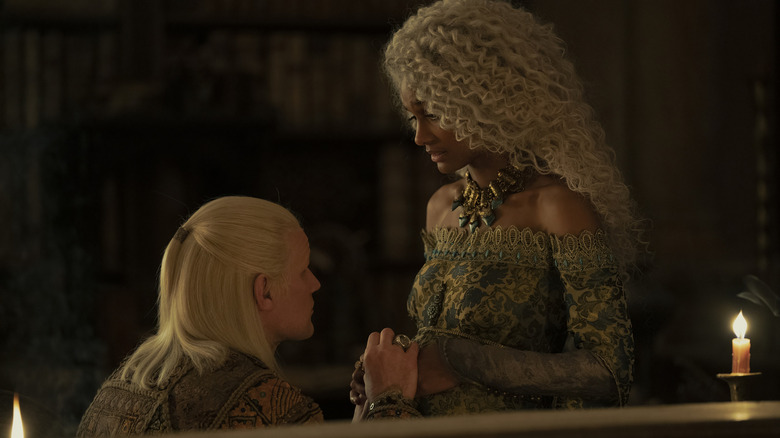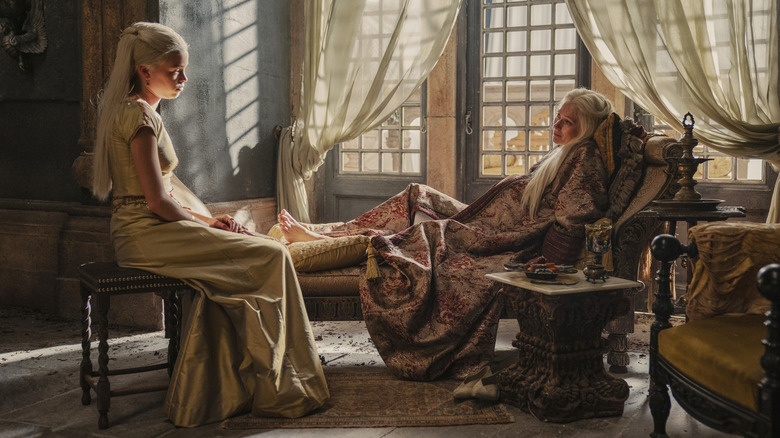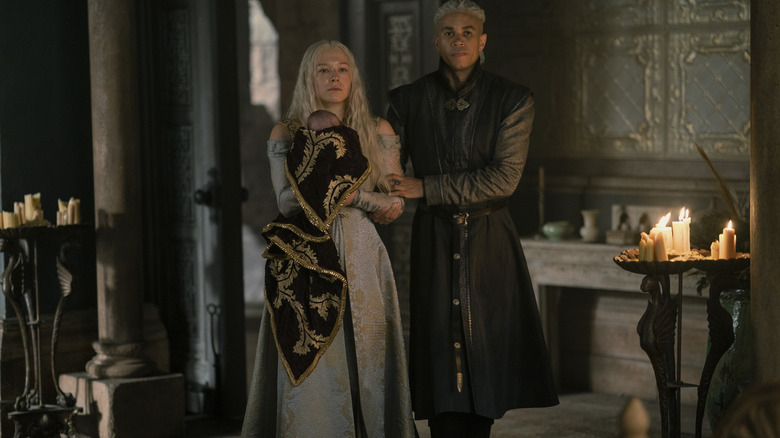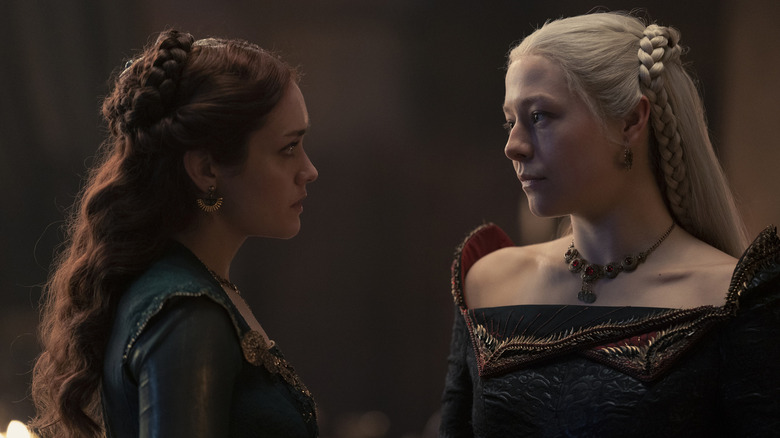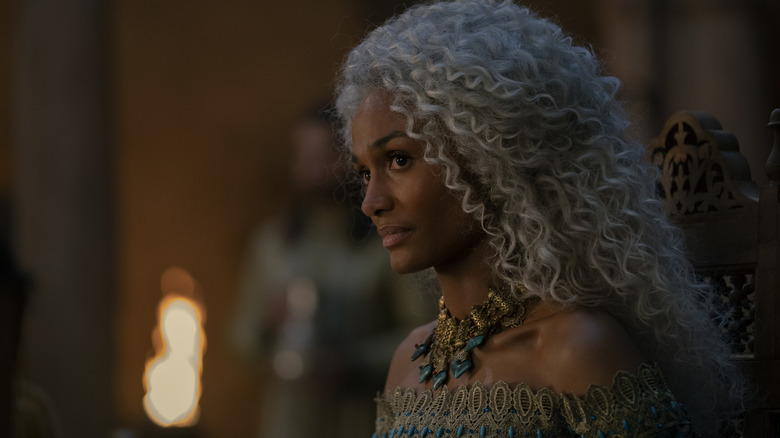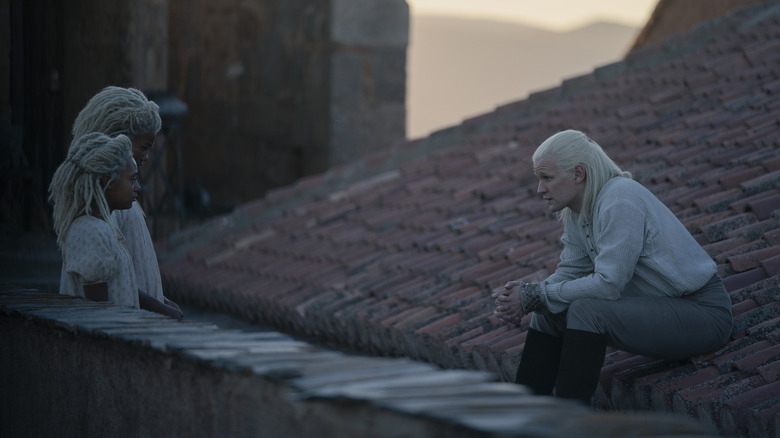House Of The Dragon Is All About How The Birthing Bed Is A Battlefield
This article contains spoilers for "House of the Dragon" episode 6.
Some fantasy stories exist as escapism, but others are more interested in using a magical world to mirror our own mundane one. George R. R. Martin's "A Song of Ice and Fire" and "Fire & Blood" books are all set in the fictional fantasy realm of Westeros, but he draws heavily from human history and deals with topics that are extremely relevant to our modern lives. "Game of Thrones" came under heavy scrutiny for its frequent and shocking portrayals of sexual assault, and thankfully, "House of the Dragon" seems to be crafted almost in response to those concerns. Executive producer and writer Sara Hess has promised that while sexual assault won't be depicted on screen, there is still plenty of gendered violence against women. Instead of feeling like exploitation, however, these scenes have a point.
It turns out that even in a world where a woman can be a beautiful, bejewelled, dragon-riding monarch, she can still be seen as little more than an incubator for future heirs. Nothing actually belongs to them: not their homes, their children, or even their bodies. Even Princess Rhaenyra (Emma D'Arcy), the heir to the Seven Kingdoms, is subject to the whims of patriarchal diplomacy. In 2022, conservative judges overturned Roe vs. Wade, removing abortion protections nationwide and forcing people with wombs back to a time as medieval as the one on "House of the Dragon." It's brutal and horrifying and exactly why the series' depictions of the challenges of birth are so important. Episode six of "House of the Dragon" begins with a time jump and depicts two very different births, highlighting the horrors of simply existing with a womb in a world run by those without them.
A terrible truth
The series premiere of "House of the Dragon" featured Rhaenyra's mother, Queen Aemma Arryn (Sian Brooke), telling her daughter that the birthing bed is their battlefield before dying in her own bloody birthing battle. Aemma's infant son was stuck in the birth canal and her husband Viserys (Paddy Considine) gave his approval to cut her open and pull the baby out, knowing full well that Aemma could not survive. The scene is horrifying, showing in detail as Aemma is held down and sliced open. She has been given milk of the poppy, an opium-derived painkiller, but she's still wide awake while everyone discusses her fate and her body begins to fail. If that sounds like something that could never happen in America in 2022, I have some scary news for you: It does. More often than you would think. In fact, despite declining maternal mortality rates globally, death rates for people giving birth have actually risen in the United States in the past decade.
Aemma's tragic death was controversial, making fans question if the series was going to make the same mistakes with violence against women as its predecessor. In episode six, "The Princess and the Queen," the series returns to the theme of reproductive servitude. We see both Rhaenyra (Emma D'Arcy) and Laena (Nanna Blondell) in labor and dealing with the aftermath. Both are faced with circumstances beyond their ability to change and each makes a desperate choice in order to have even the tiniest bit of control.
Rhaenyra's walk of pain and shame
The first time we see Emma D'Arcy as adult Rhaenyra at the beginning of episode six, she's in the middle of giving birth. The camera holds tight on Rhaenyra's sweat-soaked face as she grimaces her way through extraordinary pain. There are squelching, wet sound effects that make the viewer uncomfortably aware of what's going on even though it's not onscreen. She gives birth to a healthy baby boy and is overjoyed that he's been delivered and they're both going to survive the ordeal. Unfortunately, Queen Alicent (Olivia Cooke) wants to see the baby immediately, though she won't say why. Rhaenyra doesn't trust Alicent around her infant son, and because the queen demands that she see him immediately, Rhaenyra must walk him there herself. They haven't even cut the umbilical cord yet and she's working on getting into a dress suitable for meeting with the queen. She struggles with the painful process of delivering the afterbirth, and meanwhile her husband Laenor (John Macmillan) is bouncing around with excitement.
Laenor asks if it was "terribly painful" and offers that he "took a lance through the shoulder once" to try and comfort Rhaenyra as they slowly make their way to the Queen, but those are small comforts. Laenor even understands as much, commenting that he is "glad I am not a woman." Rhaenyra should be in bed with her new baby, resting, but instead she's being paraded before everyone in the castle. She has to show incredible strength despite her exhaustion and pain in order to protect her child, because she can't trust anyone, really.
But why does Alicent want to see the baby? Because she's playing the game of thrones, and the infant is a powerful pawn for her to exploit.
Playing into the patriarchy
Near the end of the episode, Larys Strong (Matthew Needham) gives a short monologue about how children are a great weakness, because they cause their parents to make decisions they otherwise would not. Rhaenyra's youngest son (and his two older brothers) bear no resemblance to their father and a strong resemblance to Rhaenyra's hero from her wedding night, Ser Harwen Strong. Pretty much everyone in King's Landing knows that Laenor is gay and Rhaenyra is warming her bed with the captain of the City Watch, but no one will say it outright because it would be "shameful." Alicent wants to see the baby because she knows that word of its appearance will spread like King's Landing even faster than wildfire, and will help her gain political advantage to put her son Aegon on the throne instead of Rhaenyra.
Rhaenyra's walk mirrors the one Cersei Lannister (Lena Headey) made in order to appease the new religious authority in King's Landing, to "atone" for her own (incestuous) infidelity. The princess is being shamed for giving birth to bastards, which shouldn't really be a crime or sin given the nature of her marriage, and it's being done by a woman who knows exactly how painful and tiring childbirth can be. It's cruelty for the sake of it, and shows just how ruthless the queen can be, even to another woman who was once her friend. Alicent has always played the dutiful wife and mother, after all.
The queen can't even help herself, jabbing at Laenor with the barb, "Do keep trying, Ser Laenor, sooner or later you'll get one that looks like you." That may hurt his pride, but it's nothing compared to the trail of blood Rhaenyra leaves on the ground as she hobbles back to her room.
The tragedy of Laena
Rhaenyra's embarrassment in episode six continues when her milk comes in during a small council meeting, but at least she's alive and can feel shame. Her mother didn't survive childbirth, and neither does this week's other pregnant character, Daemon's (Matt Smith) wife Laena. Laena has two little girls with Daemon already, and they argue about how the children will be raised once the youngest one is born. She wants her children to be raised in Westeros, like her ancestors, and she wants to die "a dragon-rider's death." When she goes into labor near the end of the episode, the baby becomes stuck inside of her womb, much like Aemma's.
Daemon is at least nearby, and he cares for her more than Laenor does for Rhaenyra. He stands in the doorway, watching as she struggles to give birth, and the maester recommends cutting her open the same way as Aemma. Like Viserys did before him, Daemon asks if the mother would survive. When the maester says no, Daemon refuses to let them cut into her. He cares for her and wants to give her some agency, it seems, but she's already taken things into her own hands. By the time he turns around to check on Laena, she has run out to where her dragon rests and orders her beloved mount to light her aflame.
"Dracarys," she wails, and the dragon falters. They are supposed to be completely loyal to their riders, and being ordered to burn her alive is probably pretty boggling to Vhagar's lizard mind. Daemon runs outside right as Vhagar puts Laena out of her misery and gives her the dragon rider's death she craved.
A frightening future
Daemon seems to be beginning to realize just how horrific life is for women in Westeros and beyond, and with two daughters to raise on his own, he's going to have to figure out how to either change that or protect them. The men on "House of the Dragon" have been blissfully unaware of the suffering of the women around them, but Daemon seems to finally be waking up. Will the show's brat prince grow up, or will he remain just another selfish, spoiled rich boy?
Either way, the willingness to focus on the unrelenting agony of the physical and emotional tolls of giving birth will hopefully be a rude awakening to those, like Daemon, who think the whole thing happens calmly and safely, or with storks or something. While it might not be pleasant to experience or wholesome family entertainment, it's vital that everyone wakes up and realizes that the horrors in our own healthcare system are currently just as ghastly. No one should ever be forced to give birth.
Stories about reproductive health can be triggering for me, as I spent nearly a decade searching for answers to mystery pain that ended in a hysterectomy. The worst part of it wasn't the pain of surgery, or even the pain of my illness, but just how often my choices were not actually my own. I asked one doctor for information on surgery and she looked at my wedding ring and said "I would need to talk to your husband first." My body wasn't really mine, and that's a feeling no one should ever experience in Westeros or here at home. I'm glad the show is forcing people to talk about it.
New episodes of "House of the Dragon" premiere Sundays on HBO and HBO Max.
